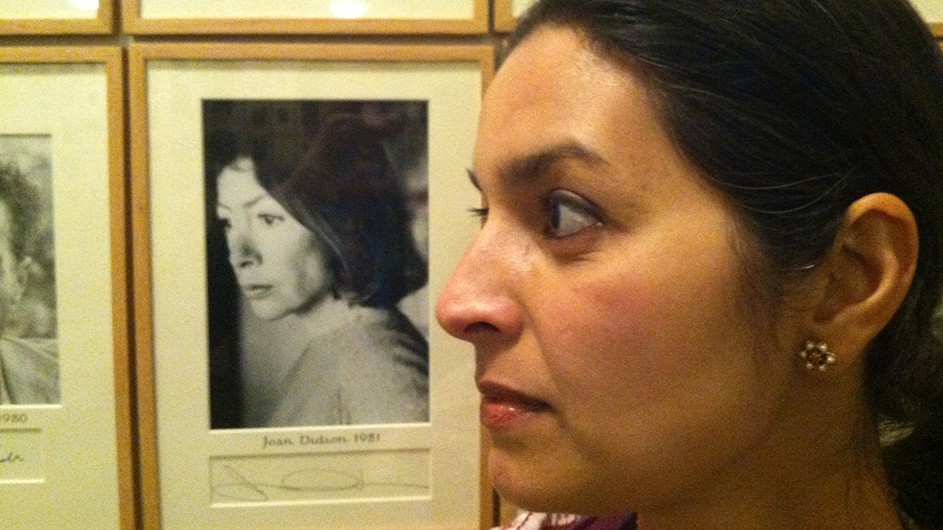Jhumpa Lahiri Returns to Barnard as a Professor
The writer, translator, and literary critic is directing Barnard’s Creative Writing Program.

Jhumpa Lahiri, who holds a B.A. in English from Barnard, returns this fall as the Millicent C. McIntosh Professor of English and director of the Creative Writing Program. She is a bilingual writer, translator, and literary critic.
In English, Lahiri is the author of two short-story collections (Interpreter of Maladies and Unaccustomed Earth) and two novels (The Namesake and The Lowland), all of which explore the experiences of Bengali immigrants in the United States. In Italian, she has written two works of nonfiction as well as a novel and a volume of poetry. She has also translated three novels by the Italian writer Domenico Starnone, and is the editor of The Penguin Book of Italian Short Stories.
Lahiri received the Pulitzer Prize for Fiction in 2000 for The Interpreter of Maladies. Other honors include the Frank O’Connor International Short Story Award, a Guggenheim Fellowship, and the PEN/Hemingway Award. In 2016, she was the recipient of a National Humanities Medal from President Barack Obama.
Columbia News caught up with Lahiri recently to discuss her return to Barnard, along with her thoughts on writing, reading, and literary translation.
How does it feel to be back at your alma mater as a teacher instead of a student?
I am honored to be returning to Barnard as a professor. As for the feeling, it is both comforting and bewildering. Let's call Barnard my Ithaka. These lines by the Greek poet C.P. Cavafy are so resonant: "Ithaka gave you the marvelous journey. / Without her you wouldn't have set out." (trans. Edmund Keeley and Philip Sherrard.)
Even now, as soon as I step out of the subway at 116th Street and Broadway, I am taken by the desire to run into the nearest library on campus, to continue learning, to read all the books I've always meant to read, to re-read books that still call to me and challenge me, or perhaps escaped me the first time around. The intellectual energy and curiosity that flourish on both sides of Broadway always give me a charge and remind me of what my priorities are. My return this fall is also personally meaningful given that my daughter will start as a first-year student at Barnard and my son will be a senior at Columbia.
What plans do you have for Barnard's Creative Writing Program? Will literary translation be part of the curriculum?
I am eager to build on an already wonderful collaboration with English Professor Ken Chen, the associate director of the Creative Writing Program at Barnard. Ken and I are united in our hope to offer courses catering to a wide variety of students who are either already actively writing or perhaps quietly meditating on the idea of writing. I was hesitant to try my hand at creative writing when I was at Barnard, and I would like to think of ways to open up possibilities for students who are still waiting in the wings, who perhaps feel the impulse to write, but are reluctant to apply for a workshop and take the plunge. So many elements contribute to a writer's formation. Creative writing workshops are places to produce and share work, but they are only one component of the long—I'd argue life-long—process of apprenticeship. Each writer's early apprenticeship is unique and happens on its own schedule.
As for translation: I believe that literary translation should be a crucial component of the writer's broader sphere of activity, whether she is well-established or just starting out. The practice of reading across languages, of stepping away from one's linguistic point of gravity, gives the writer an acute appreciation of her instrument and of technique. Translating or re-translating literary works sets the bar high while at the same time allowing us to feel intimately bound up with the mysterious, elusive operations of a literary work of art. Given that translations are acts of interpretation, translation makes us not only stronger writers, but better readers. Ideally, I would require all creative writing concentrators to take a course in literary translation.
How important to the craft of writing is reading?
Reading is everything. Reading is the soil from which the writing springs, a soil that must be cultivated and enriched and revered throughout one's life. I was a reader before I was a writer, and I know that reading will continue to engage and inspire me if the writing were to ebb. Most of my energy as a teacher of writing is focused on how to read a text, how to engage with it and absorb it, and how to appreciate it from a writer's point of view.
How does the intersection of teaching and writing affect you? Is there an overlap or do you keep the two separate?
Translating and teaching can go hand in hand; I have managed to work on translation projects and teach at the same time. I learn a great deal from my students, and I like to learn alongside them in the classroom. Writing my own stories requires more silence and detachment, generally.
What are you teaching this semester?
I am teaching a course on exophonic women writers and a course on the art and craft of the diary as a literary form.
What are you working on now, beyond teaching?
The English translation of Roman Stories, a collection of short stories I first wrote in Italian, will be published this October. I am currently co-translating Ovid's Metamorphoses with Professor Yelena Baraz, my former colleague in the Classics Department at Princeton University.